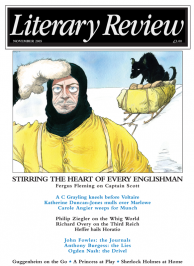Jonathan Keates
Une Femme Gallante
The Princess and the Politicians: Sex, Intrigue and Diplomacy, 1812–40
By John Charmley
Viking 350pp £20
Over the European political scene during the 1820s one woman reigned supreme. Her effect was legendary in that charmed circle of smugly victorious sovereigns, warriors and diplomats which decided the fate of nations after Napoleon’s defeat at Waterloo. Surveying her achievement in ensnaring everybody from King George IV and Tsar Alexander I to Metternich, Canning and Earl Grey, a jaundiced female contemporary remarked: ‘It is curious enough that the loves and intrigues of une femme galante should have such influence over the affairs of Europe.’ Even as an elderly woman she was considered such a political liability that the British ambassador in Paris demanded her removal from France at the outbreak of the Crimean War.
How did Dorothea, Princess Lieven, manage it? She was not especially beautiful. The diarist Thomas Creevey, though he admired her piano-playing, thought she looked like a snipe, and Sir Thomas Lawrence, in painting her portrait, made no effort to conceal a shiny nose and over-large ears. Her allure derived instead

Sign Up to our newsletter
Receive free articles, highlights from the archive, news, details of prizes, and much more.@Lit_Review
Follow Literary Review on Twitter
Twitter Feed
How to ruin a film - a short guide by @TWHodgkinson:
Thomas W Hodgkinson - There Was No Sorcerer
Thomas W Hodgkinson: There Was No Sorcerer - Box Office Poison: Hollywood’s Story in a Century of Flops by Tim Robey
literaryreview.co.uk
How to ruin a film - a short guide by @TWHodgkinson:
Thomas W Hodgkinson - There Was No Sorcerer
Thomas W Hodgkinson: There Was No Sorcerer - Box Office Poison: Hollywood’s Story in a Century of Flops by Tim Robey
literaryreview.co.uk
Give the gift that lasts all year with a subscription to Literary Review. Save up to 35% on the cover price when you visit us at https://literaryreview.co.uk/subscribe and enter the code 'XMAS24'